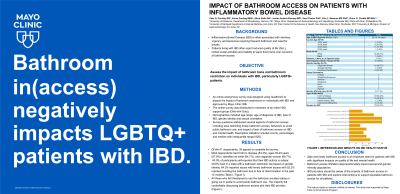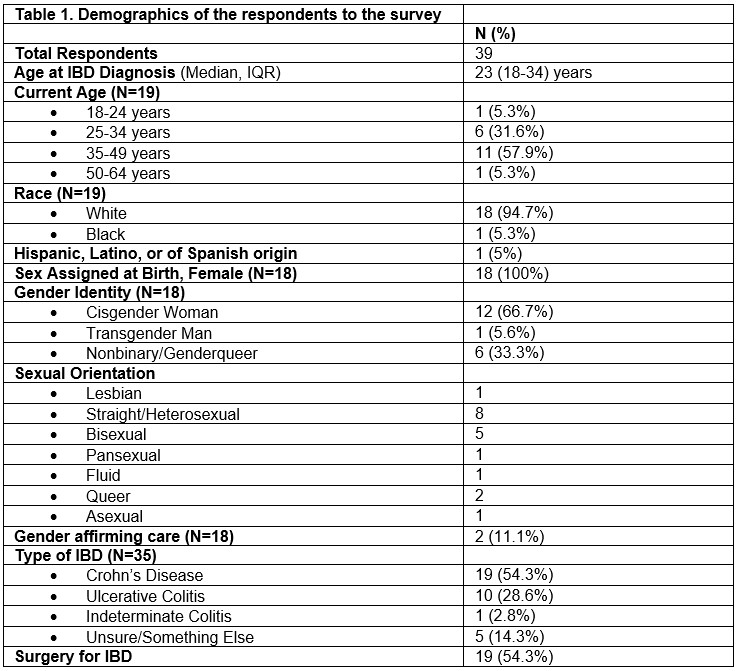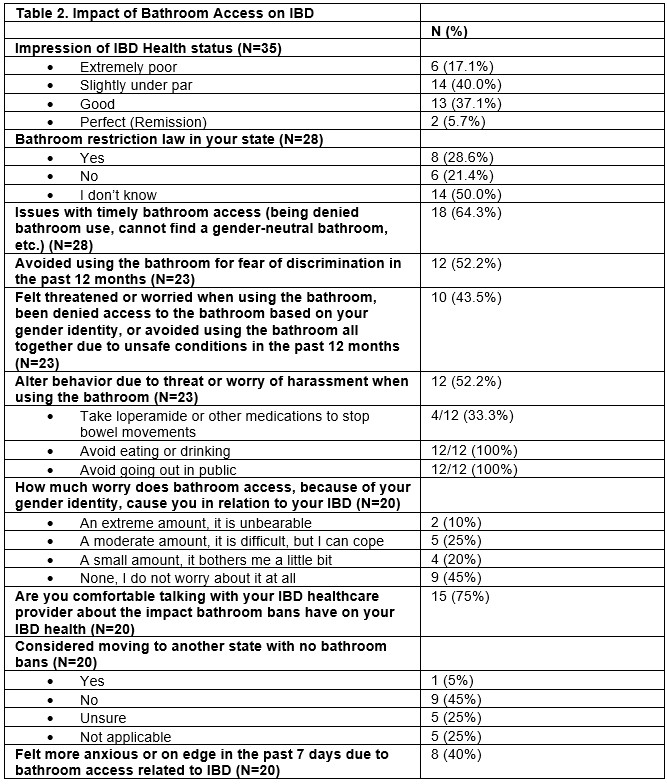Sunday Poster Session
Category: IBD
P1157 - Impact of Bathroom Access on Patients With Inflammatory Bowel Disease
Sunday, October 26, 2025
3:30 PM - 7:00 PM PDT
Location: Exhibit Hall

- CC
Cass D. Condray, BSc
University of Oklahoma
Norman, OK
Presenting Author(s)
Cass D. Condray, BSc1, Karen Doering, MBA, CCRP2, Alicia Aiello, BA3, Jordan Anders-Rumsey, MD4, Sean Phelan, PhD2, Kira Newman, MD, PhD4, Victor Chedid, MD, MSc2
1University of Oklahoma, Norman, OK; 2Mayo Clinic, Rochester, MN; 3Girls with Guts, Philadelphia, PA; 4University of Michigan, Ann Arbor, MI
Introduction: Inflammatory Bowel Disease (IBD) is often associated with diarrhea, urgency, and tenesmus requiring frequent bathroom visits. Patients living with IBD often report reduced quality of life (QoL), limited social activities and inability to leave their home over concerns of bathroom access. This might disproportionately impact individuals of sexual and gender minorities (SGM). The aim of this study was to survey individuals living with IBD on the impact of bathroom access on their disease.
Methods: The study team designed an online annonymous survey using Qualtrics© to assess the impact of bathroom restrictions on individuals with IBD. Online survey was distributed to members of an online IBD support group (Girls with Guts). Demographics included age range, age of diagnosis of IBD, type of IBD, gender identity and sexual orientation. Survey questions addressed several aspects of bathroom access including laws restricting timely bathroom access, behaviors to avoid public bathroom use, and impact of lack of bathroom access on IBD and mental health. Descriptive statistics included counts, percentages and median with interquartile range (IQR). Study was approved by IRB.
Results: Of the 41 respondents, 39 agreed to complete the survey. Table 1 shows demographics with most of the respondents with Crohn’s disease (54.3%), ages 35-49 years (57.9%), identified as white race (94.7%), and cisgender women (66.7%). Table 2 summarizes the impact of bathroom access on IBD. Of those who completed the questionnaires, 40.0% self-reported that their IBD activity is subpar, 28.6% lived in a state with a bathroom restriction law based on gender identity. 64.3% reported issues with timely bathroom access with 52.2% reported avoiding the bathroom due to fear of discrimination in the past 12 months. All those who felt threatened to use the bathroom avoided eating or going out in public to avoid public bathroom use. The majority felt comfortable discussing bathroom access with their IBD provider.
Discussion: Safe and timely bathroom access is an important need for patients with IBD with significant impacts on quality of life and mental health. Bathroom access limitations disproportionately impact SGM populations. IBD providers should be aware of the impacts of bathroom access on patients with IBD and explore interventions to support equitable bathroom access for all patients.


Disclosures:
Cass D. Condray, BSc1, Karen Doering, MBA, CCRP2, Alicia Aiello, BA3, Jordan Anders-Rumsey, MD4, Sean Phelan, PhD2, Kira Newman, MD, PhD4, Victor Chedid, MD, MSc2. P1157 - Impact of Bathroom Access on Patients With Inflammatory Bowel Disease, ACG 2025 Annual Scientific Meeting Abstracts. Phoenix, AZ: American College of Gastroenterology.
1University of Oklahoma, Norman, OK; 2Mayo Clinic, Rochester, MN; 3Girls with Guts, Philadelphia, PA; 4University of Michigan, Ann Arbor, MI
Introduction: Inflammatory Bowel Disease (IBD) is often associated with diarrhea, urgency, and tenesmus requiring frequent bathroom visits. Patients living with IBD often report reduced quality of life (QoL), limited social activities and inability to leave their home over concerns of bathroom access. This might disproportionately impact individuals of sexual and gender minorities (SGM). The aim of this study was to survey individuals living with IBD on the impact of bathroom access on their disease.
Methods: The study team designed an online annonymous survey using Qualtrics© to assess the impact of bathroom restrictions on individuals with IBD. Online survey was distributed to members of an online IBD support group (Girls with Guts). Demographics included age range, age of diagnosis of IBD, type of IBD, gender identity and sexual orientation. Survey questions addressed several aspects of bathroom access including laws restricting timely bathroom access, behaviors to avoid public bathroom use, and impact of lack of bathroom access on IBD and mental health. Descriptive statistics included counts, percentages and median with interquartile range (IQR). Study was approved by IRB.
Results: Of the 41 respondents, 39 agreed to complete the survey. Table 1 shows demographics with most of the respondents with Crohn’s disease (54.3%), ages 35-49 years (57.9%), identified as white race (94.7%), and cisgender women (66.7%). Table 2 summarizes the impact of bathroom access on IBD. Of those who completed the questionnaires, 40.0% self-reported that their IBD activity is subpar, 28.6% lived in a state with a bathroom restriction law based on gender identity. 64.3% reported issues with timely bathroom access with 52.2% reported avoiding the bathroom due to fear of discrimination in the past 12 months. All those who felt threatened to use the bathroom avoided eating or going out in public to avoid public bathroom use. The majority felt comfortable discussing bathroom access with their IBD provider.
Discussion: Safe and timely bathroom access is an important need for patients with IBD with significant impacts on quality of life and mental health. Bathroom access limitations disproportionately impact SGM populations. IBD providers should be aware of the impacts of bathroom access on patients with IBD and explore interventions to support equitable bathroom access for all patients.

Figure: Table 1. Demographics of the respondents to the survey

Figure: Table 2. Impact of Bathroom Access on IBD
Disclosures:
Cass Condray indicated no relevant financial relationships.
Karen Doering indicated no relevant financial relationships.
Alicia Aiello indicated no relevant financial relationships.
Jordan Anders-Rumsey indicated no relevant financial relationships.
Sean Phelan indicated no relevant financial relationships.
Kira Newman indicated no relevant financial relationships.
Victor Chedid: Pfizer – Grant/Research Support. Takeda – Consultant.
Cass D. Condray, BSc1, Karen Doering, MBA, CCRP2, Alicia Aiello, BA3, Jordan Anders-Rumsey, MD4, Sean Phelan, PhD2, Kira Newman, MD, PhD4, Victor Chedid, MD, MSc2. P1157 - Impact of Bathroom Access on Patients With Inflammatory Bowel Disease, ACG 2025 Annual Scientific Meeting Abstracts. Phoenix, AZ: American College of Gastroenterology.
